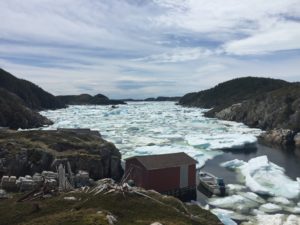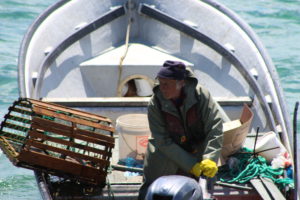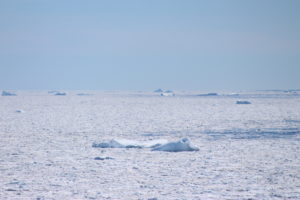Newfoundland is an ideal destination for anyone wishing to experience an arctic environment in true safety and comfort.

“… influence of the ‘Labrador Current’…”
Despite our southern latitudinal position, Newfoundland can exhibit cool, and even cold temperatures during any season thanks to the influence of the ‘Labrador Current’ and the frigid waters it delivers to our shores all year long. In addition to the multitude of bizarre climatic conditions, it also brings much bounty to the island, as its nutrient rich waters provide the primary fuel for an ecosystem that supports an eclectic mix of fish, whales, seals, and many unusual seabirds and other marine mammals.

“… cold water species…”
Winter is not a time when guests usually visit Newfoundland, but since our coldest solstice doesn’t really end until the ‘May 24’ weekend, and knowing that our ‘Spring’ remains tightly coiled and dormant until June –early season travellers may be fortunate enough to witness the remnants of a true Arctic experience here in Newfoundland.
As one of our guests suggested when she first gazed upon an icefield extending all the way from Twillingate Island to the horizon’s edge;
“You know ‘Hell’ isn’t hot Andrew; it’s cold, and it looks just like Antarctica! I can’t believe I put myself through all that torture when I could have just made the jaunt to Newfoundland for the same experience!”

“Hell isn’t hot – its cold,,,”
An interesting observation that inspired this listicle outlining the many advantages Newfoundland offers would be arctic travellers;
1. Location, location, location – Newfoundland is easily accessed through several airports with daily scheduled flights. There are two ferry connections and an intricate network of well maintained roads. You don’t have to charter a plane or travel for weeks via cruise ship to get here.
2. Travel comfort is further ensured by the many coastal communities and the extensive infrastructure found throughout the island of Newfoundland – including excellent quality hotels and restaurants
3. The original penguin was found in Newfoundland. Though now extinct, it was Captain James Cook’s experience with Newfoundland’s flightless ‘Auk’ (Genus Pinguinus) that encouraged him to use the same nomenclature for the Antarctic species and their many shared behaviours and appearances.
4. Newfoundland hosts many hundreds of nesting bird species; including a number of ‘Murres’ which bear a strong resemblance to the penguin and exhibit many similar characteristics – most particularly their swimming expertise, mating rituals, parental responsibilities, etc.
5. Spring delivers an abundance of arctic ice and icebergs to many of the bays and harbours along Newfoundland’s Northern coast. However, we aren’t subjected to the extreme temperatures required to form such massive crystals. Our ice is formed in the north and is delivered to our more temperate shores via the Labrador Current. As we often remind guests – Newfoundland weather will never kill you.
6. Though there are no predatory species in Antarctica, Polar Bears will occasionally visit the island of Newfoundland. Thankfully, this is an infrequent occurrence and they are tracked from the moment they arrive, thus posing little risk and dare we say, a wonderful bonus for anyone fortunate enough to spot and photograph one
7. 22 species of whales and many other sea mammals abound in Newfoundland’s sub arctic waters. And they can often be spotted from the shoreline or on a short, comfortable boat ride.
8. Newfoundlanders are still actively involved in arctic fishing enterprises and truly fortunate guests can sometimes witness their activities both on and off shore.
9. Newfoundland’s indigenous and European descendants utilize many arctic species as part of our dietary and cultural mosaic – making for some interesting dining choices for the ‘Foodie’ world and boutique shoppers.
10. Newfoundland is the original home for arctic exploration. Nearly every arctic expedition, regardless of polar position, was led by a Newfoundland sailing captain whose experience with ice was considered invaluable. There are many wonderful interpretive sites celebrating Newfoundland’s important role in polar exploration and discovery.
11. Newfoundland’s lobster and snow crab are harvested during “Ice Season” – and nothing compares to the sweet meat harvested from these cold water species

I knew we were hip, but who would have guessed Newfoundland was so cool!

